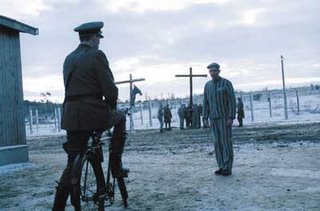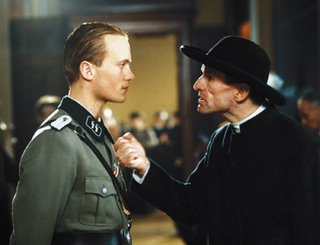The Ninth Day (2004)
Director: Volker Schlöndorff
Sixty years after the end of World War II, film makers are still wrestling with the legacy of Nazism and the horrors of the concentration camp. Documentaries such as Shoah and The
 Sorrow and the Pity take up the big picture with such brilliance and moral heat that later documentaries have been boxed into smaller corners of history, examining perceptions of Hitler by his secretary, for example, or the Kindertransport. Feature films, of course, do not face this possible handicap. Their nature is to focus on the particular to illuminate the universal; the moral agency of the main character normally puts the viewer in the seat of righteousness or pity, as with Schindler’s List and Au Revoir Les Enfants. See enough of these films and you’ll get to feeling very virtuous (I’m told that not even Downfall entirely escapes a certain level of pity for its main character, Adolf Hitler). The Ninth Day does not depart significantly from the feel of other films about Nazism, but it does something quite unique for films made these days—its narrative spine is firmly planted in philosophical debate.
Sorrow and the Pity take up the big picture with such brilliance and moral heat that later documentaries have been boxed into smaller corners of history, examining perceptions of Hitler by his secretary, for example, or the Kindertransport. Feature films, of course, do not face this possible handicap. Their nature is to focus on the particular to illuminate the universal; the moral agency of the main character normally puts the viewer in the seat of righteousness or pity, as with Schindler’s List and Au Revoir Les Enfants. See enough of these films and you’ll get to feeling very virtuous (I’m told that not even Downfall entirely escapes a certain level of pity for its main character, Adolf Hitler). The Ninth Day does not depart significantly from the feel of other films about Nazism, but it does something quite unique for films made these days—its narrative spine is firmly planted in philosophical debate. The film’s protagonist is Rev. Henri Kremer, an influential priest from Luxembourg who has been sent to the priest block at Dachau for his activities opposing the Nazis. The beginning of the film sets out in relatively economical fashion to orient Kremer and the audience to his new environment—one filled with regimentation and horrifying cruelty resisted mainly by prayer. Kremer shows himself to have a bit more backbone when he runs to the aid of a Polish priest who is being beaten with a metal poker for being unable to sing a song in German. Ulrich Matthes, whose much-commented-upon hollow cheeks and black eyes make him seem born to play a witness/victim of atrocity, fills Kremer with a certitude of purpose that comes from being a member of a very influential family and a highly placed member of the Roman Catholic Church. It is for these reasons, apparently, that he is allowed the highly unusual privilege of being released from Dachau.
Kremer is intercepted by an SS officer named Gebhardt (August Diehl) as he disembarks the train in his hometown and is told to report to SS headquarters the next day. When Kre
 mer returns home, his sister informs him that their mother is dead. When Kremer reports to Gebhardt the following day, he is told his release is only for 9 days, supposedly a bereavement leave. Naturally, there is another reason for Kremer’s release—he is to convince the bishop of Luxembourg to endorse national socialism to legitimize the actions of Germany in the Catholic countries of Europe.
mer returns home, his sister informs him that their mother is dead. When Kremer reports to Gebhardt the following day, he is told his release is only for 9 days, supposedly a bereavement leave. Naturally, there is another reason for Kremer’s release—he is to convince the bishop of Luxembourg to endorse national socialism to legitimize the actions of Germany in the Catholic countries of Europe. The film counts down each day of Kremer’s leave, adding a sense of doom to the grim, gray look of the film and putting a limit on the amount of moral debate Kremer can engage in with himself, his family, his fellow clergymen, and Gebhardt. Flashbacks to Dachau reveal a secret guilt Kremer has been harboring regarding the death of a fellow cleric whom he felt he might have been able to save if he had been less selfish. Is this sin the chink in the armor Gebhardt will be able to chip away at to secure what he is after? The men engage in a short and savage debate on the true meaning of the life and acts of Judas.
It is in this and other exchanges with Gebhardt that the audience is invited into areas I can't remember visiting in this way since the release of A Man for All Seasons in 1966. It is one only philosophers and ethicists frequent with any regularity—the philosophical underpinning of social interactions, including moral utilitarianism and relativism. In trying to convince Kremer to capitulate, the bishop’s secretary says that resistance to the Nazis sent 20,000 Dutch non-Aryan Christians to their deaths. Wouldn’t it have been better to save those lives at little cost to the Church? We wonder along with Kremer what the true cost of capitulation would have been. Does an absolute moral good of condemning the Nazis demand blood sacrifice in the name of all humanity? In posing these questions within a true life-and-death situation for Kremer, the audience is forced to think in more than just a kneejerk way. This is the great strength of The Ninth Day.
Ultimately, Kremer utters a line that will linger with me for many years to come. In considering how he should decide, he poses a question to Gebhardt: “What does a killer want most from his victim after the victim is dead?” The answer may have little to do with Nazism, but it is a question individual Nazis may have asked themselves and one we all should to ask ourselves in considering how we conduct our lives. l


0 Comments:
Post a Comment
<< Home